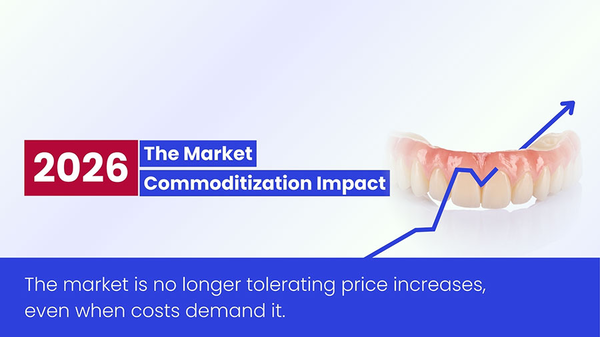Frame partial dentures are a popular solution for patients missing multiple teeth while preserving their natural dentition. These removable prosthetics consist of a framework supporting artificial teeth, providing both functionality and aesthetics. The choice of framework material plays a crucial role in durability, comfort, and cost-effectiveness.
Table of contents [Show]
- What Are Frame Partial Dentures?
- Importance of Material Selection
- Common Frame Materials for Partial Dentures
- Comparing Different Frame Partial Dentures Framework Materials
- How to Choose the Right Frame Partial Dentures Manufacturer?
- A Right Frame Partial Dentures Dental Lab from Vietnam - XDENT LAB
Frame partial dentures are a popular solution for patients missing multiple teeth while preserving their natural dentition. These removable prosthetics consist of a framework supporting artificial teeth, providing both functionality and aesthetics. The choice of framework material plays a crucial role in durability, comfort, and cost-effectiveness. Through this article, let's learn what frame partial dentures are, and the types of materials used to make frame partial dentures.
What Are Frame Partial Dentures?
Frame partial dentures (FPDs) are a popular solution for patients who need to replace multiple missing teeth while preserving the natural structure of their remaining teeth. These prosthetics consist of a metal or resin framework supporting artificial teeth, providing both functionality and aesthetics. They are commonly used as a cost-effective and less invasive alternative to fixed dental restorations like bridges and implants.
Importance of Material Selection
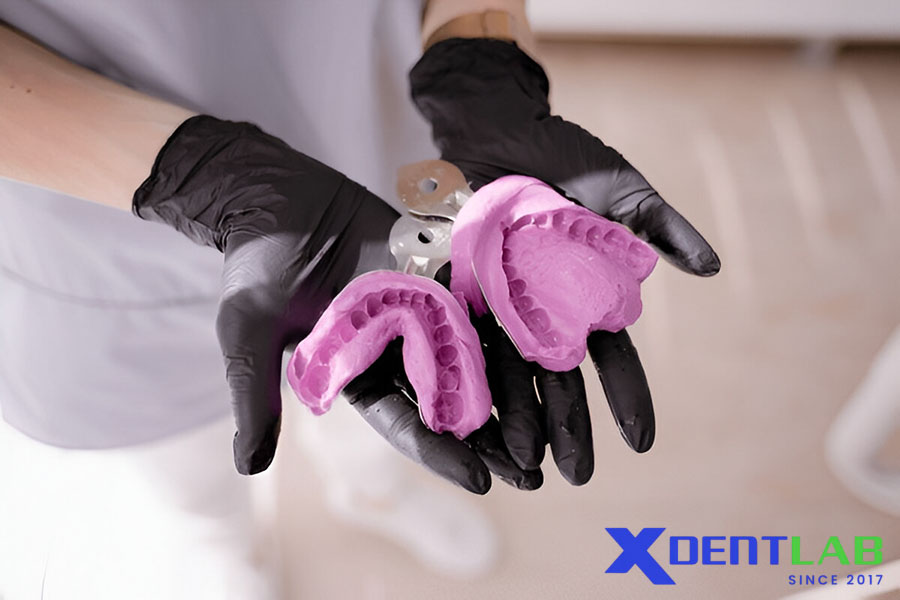
Choosing the right material for frame partial dentures is essential for long-term performance and patient satisfaction. The ideal material should offer:
Strength and durability to withstand daily use.
Biocompatibility to prevent allergic reactions or irritation.
Aesthetic appeal to blend naturally with existing teeth.
Lightweight properties for maximum comfort.
Different materials have varying advantages, making the selection process an important factor in achieving the best treatment outcomes.
Common Frame Materials for Partial Dentures
Metal frames are the most traditional and widely used material for FPDs. Typically made from cobalt-chromium (Co-Cr) or nickel-chromium alloys, these frameworks offer high strength, excellent longevity, and precise fit. However, they may be heavier and less flexible than other options, which could be a drawback for some patients.
Pros:
High strength and longevity.
Resistant to wear and breakage.
Precise fit for stability.
Cons:
Heavier than alternative materials.
Metal clasps can be visible, affecting aesthetics.
Requires an extensive fabrication process.
Titanium Frame
Titanium frames are an alternative to traditional cast metal. Known for their lightweight properties and excellent biocompatibility, titanium FPDs reduce the risk of allergic reactions while maintaining strength. They are also highly resistant to corrosion, ensuring long-term durability.
Pros:
Lightweight and comfortable.
Corrosion-resistant and biocompatible.
Ideal for patients with metal allergies.
Cons:
More expensive than cobalt-chromium.
Can be more challenging to manufacture.
Flexible Resin Frame/ Acetal Frame
Acetal resins are modern thermoplastic materials used for FPD frames. These options offer a metal-free alternative with enhanced aesthetics and flexibility, making them a preferred choice for patients seeking comfort.
Pros:
No metal clasps—better aesthetics.
Lightweight and flexible.
Hypoallergenic and biocompatible.
Cons:
Less durable than metal frameworks.
Prone to slight discoloration over time.
Higher production costs.
3D-Printed Frame
With advancements in digital dentistry, 3D-printed frames are gaining popularity. These frameworks, often made from high-performance resins or metal alloys, offer precision, efficiency, and faster turnaround times. 3D printing enables custom design capabilities, ensuring an optimal fit for patients. While still evolving, this technology is expected to become a mainstream option in the near future.
Pros:
Highly precise and customizable fit.
Faster production process.
Potential for cost reduction with evolving technology.
Cons:
Durability varies depending on the material used.
May require additional post-processing for optimal fit and strength.
Comparing Different Frame Partial Dentures Framework Materials
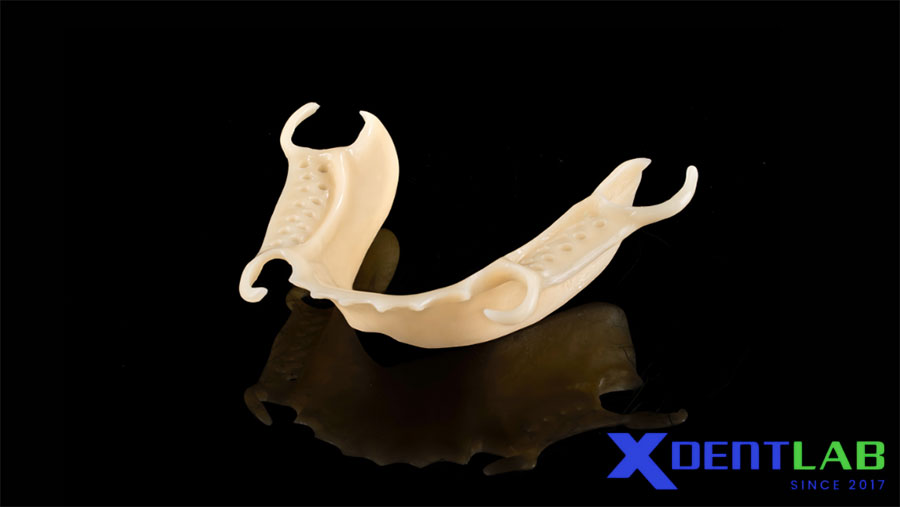
Strength and Durability
Cast Metal: High strength, long lifespan, resistant to wear.
Titanium: Lightweight but strong, corrosion-resistant.
Flexible Resin: Less durable, prone to wear over time.
3D-Printed: Varies by material used, but offers high precision and customization.
Aesthetic and Comfort Considerations
Cast Metal: Visible metal clasps, may feel rigid.
Titanium: More discreet, but still metallic.
Flexible Resin: Natural appearance, no metal clasps, high comfort.
3D-Printed: Customizable aesthetics depending on the material used.
Cost and Accessibility
Cast Metal: Affordable and widely available.
Titanium: Higher cost but premium quality.
Flexible Resin: Mid-range pricing, but limited longevity.
3D-Printed: Costs vary depending on technology and material.
How to Choose the Right Frame Partial Dentures Manufacturer?
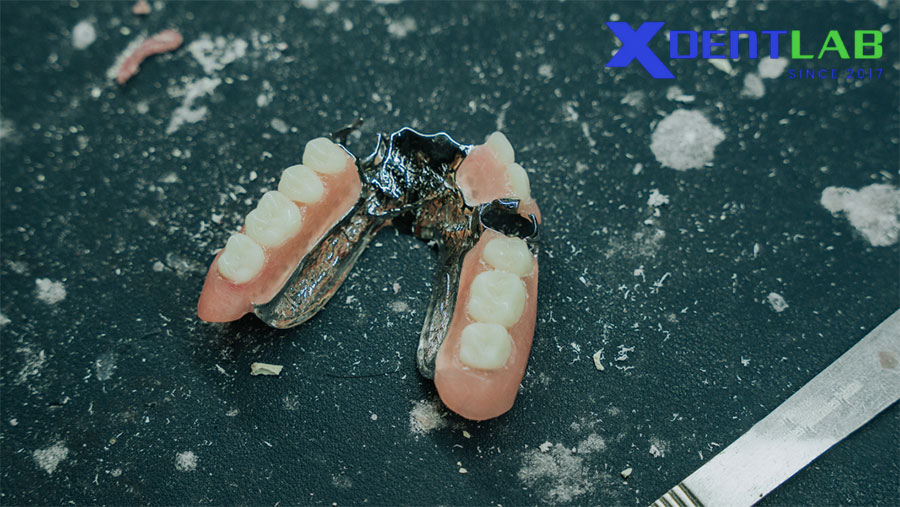
Selecting the right manufacturer for frame partial dentures is essential to ensure high-quality restorations that meet clinical and patient expectations. Several factors should be considered:
Patient Needs: Consider factors such as metal allergies, aesthetics, and comfort preferences.
Budget: Balance affordability with quality and longevity.
Longevity: Assess material durability to minimize future repairs or replacements.
A Right Frame Partial Dentures Dental Lab from Vietnam - XDENT LAB
XDENT LAB specializes in providing high-quality denture lab solutions to dental organizations across the United States.Our state-of-the-art facility and experienced technicians ensure precision-crafted frame partial dentures using the latest materials and high-quality craftsmanship.
We offer:
Competitive Pricing to help dental businesses optimize operating costs.
Reliable Turnaround Times to keep your practice efficient and profitable.
Expert Craftsmanship with stringent quality control for durable, comfortable, and aesthetic restorations.
Partner with XDENT LAB today and experience premium denture lab outsourcing solutions that enhance your dental practice’s efficiency and patient satisfaction. Contact us now to learn more about our frame partial denture solutions!
XDENT LAB is an expert in Lab-to-Lab Full Service from Vietnam, with the signature services of Removable & Implant, meeting U.S. market standards – approved by FDA & ISO. Founded in 2017, XDENT LAB has grown from local root to global reach, scaling with 2 factories and over 100 employees.. Our state-of-the-art technology, certified technicians, and commitment to compliance make us the trusted choice for dental practices looking to ensure quality and consistency in their products.
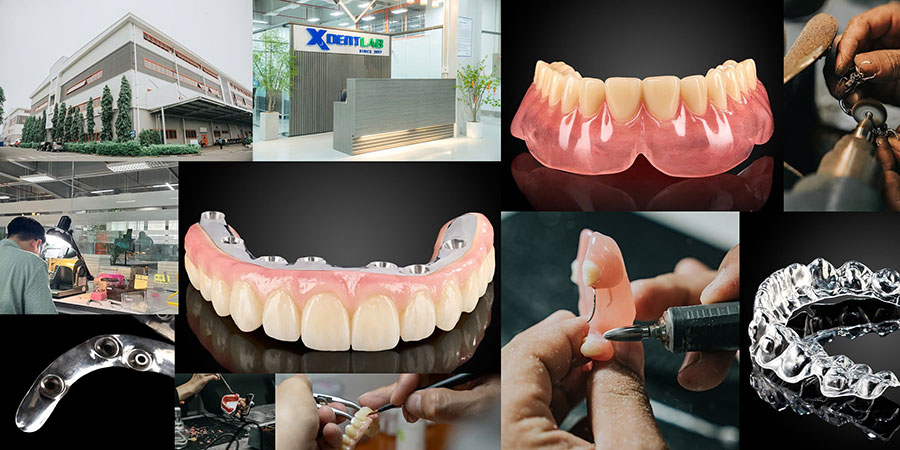
Our commitments are:
100% FDA-Approved Materials.
Large-Scale Manufacturing, high volume, remake rate < 1%.
2~3 days in lab (*digital file).
Your cost savings 30%.
Uninterrupted Manufacturing 365 days a year.
Contact us today to establish a strategy to reduce operating costs.
--------❃--------
Vietnam Dental Laboratory - XDENT LAB
🏢 Factory 1: 95/6 Tran Van Kieu Street, Binh Phu Ward, Ho Chi Minh City, Vietnam
🏢 Factory 2: Kizuna 3 Industrial Park, Can Giuoc Commune, Tay Ninh Province, Vietnam
☎ Hotline: 0919 796 718 📰 Get detailed pricing
Share this post:

